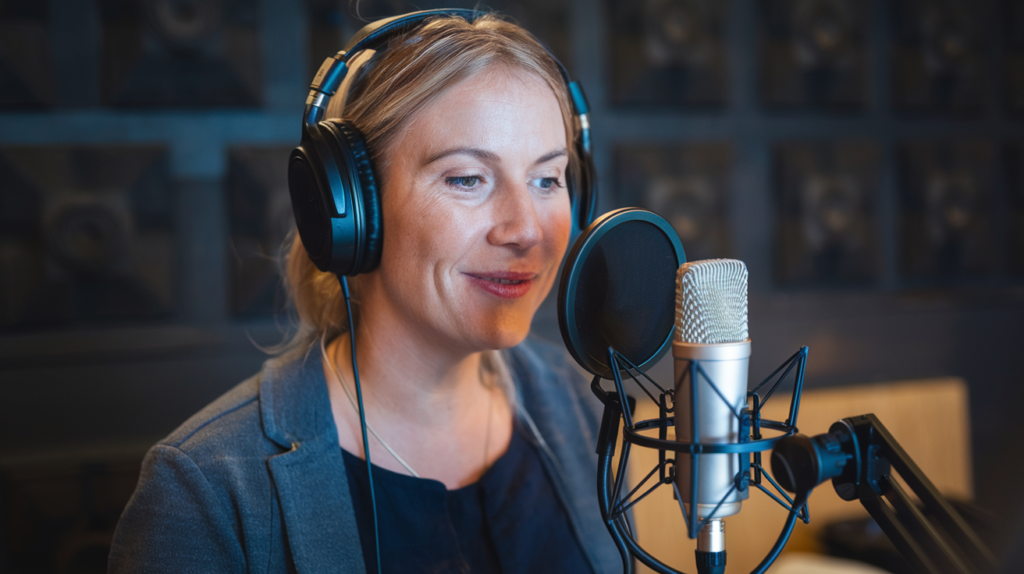Key Takeaways
- Unique Linguistic Features: New Zealand English (NZE) has distinct pronunciation patterns and idiomatic expressions that require skilled voice actors to accurately capture its essence.
- Cultural Context Importance: Understanding Kiwi culture is crucial for dubbing; knowledge of local slang and humor enhances relatability and emotional engagement with audiences.
- Accent Challenges: Variations in accent and pronunciation, such as the short ‘i’ sound in “fish” sounding like “fush,” necessitate voice artists who can replicate these nuances authentically.
- Impact on Viewer Engagement: Effective dubbing practices significantly influence how audiences perceive content, enhancing authenticity and relatability by reflecting familiar cultural contexts.
- Best Practices for Dubbing: Hiring experienced voice artists, emphasizing cultural context, conducting thorough script analyses, providing clear direction during recording, utilizing rehearsals effectively, and prioritizing quality control are essential steps for successful dubbing.
Ever wondered why dubbing New Zealand English can be such a challenge? With its unique accent and rich cultural nuances, capturing the essence of Kiwi speech isn’t always straightforward. You might think it’s just about translating words, but there’s so much more to consider.
Overview of Dubbing in Film and Television
Dubbing involves replacing the original audio track with a new one, allowing audiences to enjoy films and television shows in their native languages. This process goes beyond simple translation; it requires careful attention to accents, cultural references, and emotional nuances. When dealing with New Zealand English, unique challenges arise due to its distinct pronunciation and idiomatic expressions.
Voiceovers play a crucial role in dubbing, as voice actors must capture not only the words but also the essence of the characters. Consider how different Kiwi slang or humor might resonate differently across cultures. A skilled voice talent understands these subtleties and adjusts their performance accordingly.
The choice of voice artist significantly affects how well a dubbed production connects with its audience. Voice over talents often need extensive training to deliver authentic performances that reflect local dialects. Adapting tone and timing while maintaining emotional integrity can make or break a project.
Successful dubbing demands more than just linguistic skills; it requires an understanding of cultural context and character portrayal through effective voice acting. Engaging voice over artists bring life to scripts by resonating with viewers on multiple levels, ensuring that both dialogue and delivery align seamlessly with the original intent.
Understanding New Zealand English
New Zealand English (NZE) presents unique challenges that require an in-depth understanding for effective dubbing. Its distinctive accent and cultural nuances make it essential to capture the essence of Kiwi speech accurately.
Unique Linguistic Features
NZE includes specific pronunciation patterns that set it apart from other English dialects. For example, vowel sounds often differ, such as the short ‘i’ in “fish,” which can sound closer to “fush.” This phonetic variation necessitates skilled voice actors who can mimic these nuances convincingly. Additionally, NZE incorporates various loanwords from Māori, enriching its vocabulary and requiring voice talent familiar with these terms to ensure authenticity.
Cultural Context and Idioms
Understanding the cultural context is vital when dubbing NZE. New Zealanders use idiomatic expressions and slang that reflect their unique lifestyle and humor. Phrases like “sweet as” or “no worries” carry significant meaning within Kiwi culture but may confuse audiences unfamiliar with them. Dubbing professionals must not only translate words but also convey the intended sentiment behind these phrases. Choosing a voice artist who grasps these subtleties enhances relatability for viewers, ensuring the original tone resonates despite language barriers.
Challenges in Dubbing New Zealand English
Dubbing New Zealand English (NZE) presents unique challenges that go beyond simple translation. The distinct accent and pronunciation patterns require skilled voice actors to accurately capture the essence of Kiwi speech.
Accent and Pronunciation Variations
New Zealand English features notable pronunciation variations. For instance, the short ‘i’ in “fish” sounds like “fush,” which can confuse non-native speakers. Voice artists must adapt their delivery to replicate these nuances authentically, ensuring that dialogues resonate with local audiences. Additionally, specific vowel shifts characterize NZE, making it essential for voice talent to be familiar with these subtleties for effective dubbing.
Cultural Nuances and References
Cultural context plays a pivotal role in successful dubbing. New Zealanders often incorporate idiomatic expressions and slang into their conversations, such as “sweet as” or “no worries.” Understanding these phrases is crucial for voice actors; getting them right can enhance relatability while maintaining the original sentiment. Misinterpretation of cultural references may lead to confusion for viewers unfamiliar with Kiwi humor or lifestyle.
Voiceover professionals need not only linguistic skills but also an appreciation of these cultural elements. They strive to embody characters fully, navigating through local slang and emotional tones effectively. This depth of understanding ensures that both dialogue and delivery connect meaningfully with audiences while preserving the original content’s intent.
Impact on Audience Perception
Dubbing New Zealand English (NZE) significantly influences audience perception. The intricacies of Kiwi speech, including its unique accent and cultural references, shape how viewers engage with content. Recognizing these aspects ensures that audiences not only understand the dialogue but also connect emotionally with the characters.
Viewer Engagement
Engaging viewers hinges on effective dubbing practices. When voice actors capture the essence of NZE, they enhance relatability and immersion for audiences. For example, using local slang or idiomatic expressions can draw in viewers who recognize those phrases as part of their culture. If a voice artist skillfully navigates these nuances, it elevates the viewing experience by making it feel authentic and true to life.
Authenticity and Relatability
Authenticity matters when dubbing NZE. A voice over actor must embody not just the words but also the spirit behind them. When you hear a voice that resonates with your own experiences or reflects familiar cultural contexts, it creates an instant connection. This connection fosters relatability; audiences are more likely to stay engaged when they feel represented through accents and expressions that mirror their reality.
Using skilled voice talent is essential in this process. Voice artists capable of accurately mimicking pronunciation patterns—like turning “fish” into “fush”—help maintain authenticity while ensuring clarity for international audiences unfamiliar with Kiwi vernacular. By prioritizing both linguistic accuracy and cultural nuance, you create a memorable viewing experience that respects both the source material and its audience’s expectations.
Solutions and Best Practices
Navigating the complexities of dubbing New Zealand English (NZE) demands a strategic approach. You can enhance the quality of voiceovers by focusing on several key practices.
1. Hire Skilled Voice Artists
Choose voice artists with experience in NZE, who understand its unique accents and idiomatic expressions. Their familiarity with local pronunciation patterns, like the short ‘i’ sound, is crucial for authenticity.
2. Emphasize Cultural Context
Engage voice actors who grasp New Zealand culture. They should know common slang phrases and their emotional weight, ensuring that they convey humor and sentiment accurately.
3. Conduct Thorough Script Analysis
Before recording, analyze scripts for cultural references or idiomatic language that may not translate directly. This helps voiceover talent adapt dialogue to resonate with local audiences without losing meaning.
4. Focus on Direction During Recording
Provide clear direction during sessions to guide voice actors on tone and delivery. Feedback should be specific to ensure they capture the essence of characters while aligning with cultural nuances.
5. Utilize Rehearsals Effectively
Encourage rehearsals to allow voice talents to acclimate to script rhythms and character emotions. Practicing together fosters chemistry among cast members, enhancing overall performance quality.
6. Prioritize Quality Control in Post-Production
Implement rigorous quality control measures after recording sessions. Review audio for clarity and emotional resonance before finalizing it for distribution; this ensures the end product meets high standards.
By implementing these best practices, you create engaging dubbing experiences that resonate well with audiences while respecting the source material’s integrity.
Conclusion
Dubbing New Zealand English presents unique challenges that go beyond simple translation. To truly capture the essence of Kiwi speech you need skilled voice artists who understand its distinct accent and cultural nuances. The subtleties of pronunciation and idiomatic expressions play a crucial role in creating an authentic experience for viewers.
By employing best practices such as thorough script analysis and quality control, you can enhance viewer engagement while respecting the original content. Emphasizing cultural context ensures that audiences connect with characters on a deeper level, fostering relatability and immersion. When done right, dubbing has the power to transform how international audiences perceive New Zealand stories, making them feel just as vibrant and engaging as they were intended to be.
Frequently Asked Questions
What makes dubbing New Zealand English (NZE) challenging?
Dubbing NZE is challenging due to its unique accent, specific pronunciation patterns, and cultural nuances. Voice actors must accurately capture the distinct sounds of Kiwi speech, such as the short ‘i’ in “fish” pronounced as “fush,” along with idiomatic expressions and slang that reflect local culture.
Why is cultural context important in dubbing?
Cultural context is crucial in dubbing because it helps convey the intended meaning behind expressions and humor unique to New Zealanders. Understanding local slang, idioms, and references ensures that voice actors deliver lines authentically and resonate with audiences.
How does the dubbing process work?
The dubbing process involves replacing an original audio track with a new one tailored for specific languages. This requires careful attention to accents, emotional tone, and cultural references so that viewers can enjoy content in their native language while maintaining the essence of the original performance.
What role do voice artists play in successful dubbing?
Voice artists are essential for successful dubbing as they embody characters while navigating accents and local slang. Their ability to adapt tone, timing, and understanding of Kiwi expressions significantly impacts how well audiences connect with the content being dubbed.
What best practices should be followed for effective NZE dubbing?
Best practices for effective NZE dubbing include hiring skilled voice artists familiar with Kiwi accents, emphasizing cultural context during recording sessions, conducting thorough script analysis for appropriate dialogue adaptation, providing clear direction, utilizing rehearsals for better performance quality, and ensuring quality control in post-production.







